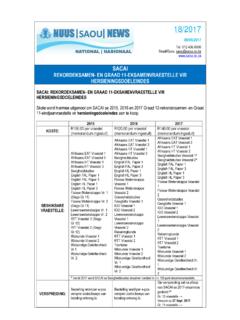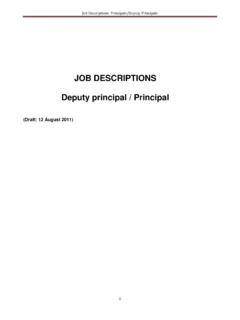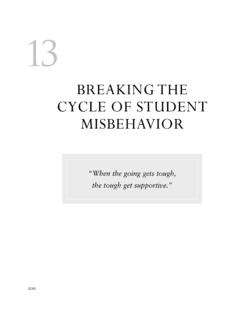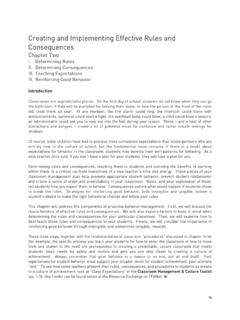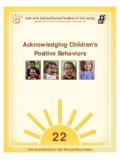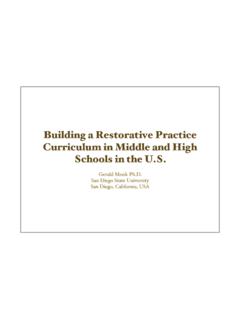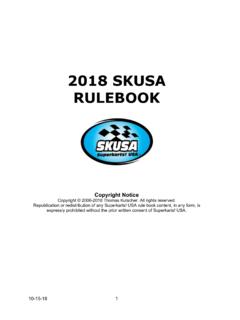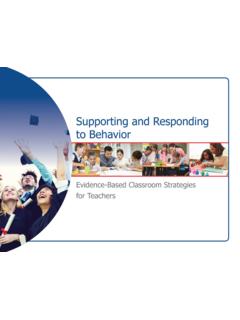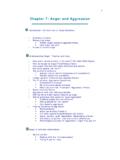Transcription of ACCOMMODATING BARRIERS TO LEARNING IN AN …
1 ACCOMMODATING BARRIERS TO LEARNING IN AN INCLUSIVE EDUCATION SYSTEM PROFESSIONAL DEVELOPMENT SERVICES OVERVIEW The principle of Inclusivity Looking at the current reality Policies guiding inclusion BARRIERS to LEARNING ACCOMMODATING BARRIERS to LEARNING Curriculum Differentiation Revised SIAS policy Concessions THE PRINCIPLE OF INCLUSIVITY SPECIAL NEEDS MODEL INCLUSIVITY Medical Model Social Model It is not about learners with disabilities, it is about the needs of all learners. THE CURRENT REALITY WHO Average norm of 3% disabilities in any system WHO 20% learners will experience some sort of a barrier throughout the schooling career. 2012: 231 459 ( ) learners with BARRIERS / disabilities in special and mainstream schools (Total number of learners in the system: 12 513 638) The implication is that there is about 400 000 learners in the system without any support. PERCENTAGE DISTRIBUTION OF LEARNERS IN THE EDUCATION SYSTEM IN 2012 Source: Education Statistics in South Africa 2012; Jan 2014 THROUGHPUT RATE - 2013 0200000400000600000800000100000012000001 400000Gr RGr 1Gr 2Gr 3Gr 4Gr 5Gr 6Gr 7Gr 8Gr 9Gr10Gr11Gr12 Series1 Throughput rate: 2013 National Senior Certificate POLICIES GUIDING INCLUSIVITY: Constitution of the Republic of South-Africa No 108 of 1996 (Bill of Rights, Chapter 2) Convention on the Rights of Persons with Disabilities (United Nations May 2008) National Education Policy Act, 1996 South African Schools Act, no.
2 84 of 1996 White Paper 6: Special Education - Building an Inclusive Education and Training System, (2001) Revised SIAS Policy (2014) GUIDELINE DOCUMENTS Guidelines for Inclusive Teaching and LEARNING (2010) Guidelines for responding to learner diversity in the classroom through curriculum and Assessment Policy statements (2012) Guidelines for Full-Service/Inclusive Schools Guidelines to ensure quality education and support in Special Schools and Special School Resource Centres Integrated School Health Policy (ISHP) Care and Support for Teaching and LEARNING (CSTL) Children s Act No 38 of 2005, and Children s Amendment Act No 41 of 2007 ACCOMMODATING BARRIERS TO LEARNING IN THE SYSTEM Level 1 Low needs Level 2 Medium needs Level 3 High needs 1 Mainstream schools 2 Full Service schools 3 Special schools Academic Focus schools BARRIERS TO LEARNING BARRIERS to LEARNING refer to difficulties that arise within the education system as a whole, the LEARNING site and/or within the learner him/herself, which prevent access to LEARNING and development.
3 Screening, Identification, Assessment & Support Policy 2014 CAUSES OF BARRIERS TO LEARNING INTERNAL/CHILD ENVIRONMENT Specific BARRIERS to LEARNING Socio-economic System Neurological Physiological SCHOOL Genetic DYNAMIC INTERPLAY BARRIERS Emotions/ Behaviour BEHAVIOR DISORDERS OPPOSITIONAL DEFIANT DISORDER Seem to say NO on principle Deliberately do things to annoy others Often loses temper Blames others for his/her mistakes or misbehavior Often touchy and easily annoyed Often spiteful and vindictive Do however show remorse Includes passive aggressive behavior BEHAVIOR DISORDERS CONDUCT DISORDER A repetitive and persistent pattern of behavior in which the basic rights of others and major age appropriate societal norms and rules are violated Includes aggression to people and animals, destruction of property, deceitfulness or theft and serious violations of rules Show no remorse Often leads to anti-social personality disorder BARRIERS WITHIN THE CHILD NEUROLOGICAL ADHD Epilepsy Tics Tourette Autism Obsessive Compulsive Depression and anxiety disorders Specific LEARNING disorders PHYSIOLOGICAL Deaf/hard of hearing Blind/low vision Physical disabled Multiple disabled Developmental delays GENETIC Down Syndrome BEHAVIOUR Conduct Disorder Anti-social behaviour Psychopath Emotional problems LOW COGNITION IQ Brain injuries FAS Category BARRIERS to LEARNING in Main Stream Number Specific LEARNING disorders 26 029 ADHD 23 981 Low vision 19 658 Moderate intellectually disabled 19 704 Hard of hearing 6890 Behaviour 7026 Epilepsy 4702 Physically disabled 4616 Severely intellectually disabled 3085 Autism spectrum 1209 Psychiatric disorders 967 Deaf 769 Blind 433 Cerebral disabled 422 Deaf/blind 233
4 Multiple disabled 138 Category disabilities: Special Schools Number Moderate Intellectually disabled 30 424 Severely Intellectually disabled 27 131 Specific LEARNING disorders 13 051 Other 10 780 Deaf 6590 Cerebral Disabled 6 127 Behaviour 4427 Physical disabled 3 888 ADHD 3 396 Autism spectrum 2 753 Epilepsy 2542 Low vision 2495 Hard of hearing 1347 Blind 1307 Psychiatric disorders 145 Deaf/Blind 122 Multiple disabled 5 SPECIFIC LEARNING DISORDER DSM V: Difficulties LEARNING and using academic skills, as indicated by the presence of at least one of the following symptoms that have persisted for at least 6 months, despite provision of interventions that target those difficulties: SPECIFIC LEARNING DISORDER or slow and effortful word reading understanding the meaning of what is read with spelling with written expression mastering number sense, number facts, or calculation with mathematical reasoning Specify: SLD with impairment in reading Word reading accuracy Reading rate and fluency Reading comprehension Alternative term: Dyslexia SLD with impairment in written expression Spelling accuracy Grammar and punctuation accuracy Clarity or organization of written expression SPECIFIC LEARNING DISORDER SPECIFIC LEARNING DISORDER Specify: SLD with impairment in mathematics Number sense Memorizing of arithmetic facts Accurate or fluent calculation Accurate math reasoning Alternative term: Dyscalculia CURRICULUM DIFFERENTIATION One-size-fits-all does not work!
5 !! Policies allows for differentiation Differentiation : Content Teaching strategies Assessment (and concessions) INTERVENTION STRATEGIES CURRICULUM DIFFERENTIATION One-size-fits-all curriculum does not work!!! Provided for differentiation in the policies Differentiation : Content Teaching strategies Assessment (and concessions) SIAS 2014: Curriculum Differentiation seen as a type of concession!! (Straddling) CONCESSIONS IMMIGRANT LEARNERS LEARNERS EXPERIENCING BARRIERS TO LEARNING CONCESSIONS: IMMIGRANTS An immigrant learner is: A child or dependant of a diplomatic representative of a foreign government accredited in SA, or A person who: - first enrolled at and entered a SA school in Gr 7 or thereafter - began schooling in SA, has attended school outside SA for two or more consecutive years after Gr 3 and has subsequently returned to SA Gr 4 9: An Immigrant learner must: Offer the two official languages as required, and comply with the School-based assessment requirements.
6 Pass one of the required two official languages as on at least First Additional Language level and obtain a rating of Moderate Achievement (Level 3) in that language; Gr 10-12: An immigrant may offer only one (1) official language on at least First Additional Language Level, provided it is the language of LEARNING and teaching, and obtain a rating of 30% level in that language. CONCESSIONS: IMMIGRANTS BARRIERS might in one way or another prevent the learner from giving a true account of his/her knowledge and skills when assessed and might require adaptive methods of assessment. Department of Education Republic of South Africa Directorate: Inclusive Education Curriculum 2005 Assessment Guidelines for Inclusion May 2002 ACCOMMODATION OF BARRIERS TO LEARNING To maximise the academic development of these learners on an equal basis with others (Convention on the Rights of Persons with Disabilities, Article 24) To equalise opportunities for all learners by addressing BARRIERS learners may experience To provide support for learners that will enable them to give a true account of their knowledge and skills There should be high expectations of learners, and the standard of assessment must not be compromised, nor should the learner be given an unfair advantage over his/her peers.
7 WHY CONCESSIONS? Learners with low cognitive functioning Learners with poor language competency because the language of assessment is not the home language of the learner (immigrants excluded) NOT INTENDED The purpose of a concession is to bridge the gap between a learner s potential and his current under-achievement. Fairness (Comply with assessment criteria) Do not compromise the standard of assessment No unfair advantage over fellow learners Apply same academic requirements for all learners Equalise opportunities to give true account of knowledge and skills Granted to learners with potential to benefit Based on support needed, not on categories of disability or LEARNING difficulty Address the barrier, do not compensate for it Provide support as early as possible PRINCIPLES Determination of learners who are eligible for differentiated assessment and accommodations in Grades 10 to 12 should have been done as early as the Foundation Phase or at least by October of their Grade 10 year, except in a situation where need arises at a later stage.
8 IDENTIFICATION OF CANDIDATES FOR ALTERNATIVE AND/OR ADAPTIVE ASSESSMENT Deaf learners and learners with communication and language impairments Gr 4-9: -Must offer the two required official languages (SASL is considered an official language) - May obtain an Elementary achievement (level 2) in the second official language, and - Comply with the other promotion requirements CONCESSIONS: BARRIERS Deaf learners and learners with communication and language impairments Gr 10-12 -may offer one (1) official language at First Additional Language level which is the language of LEARNING and teaching, provided that another subject from Group B is offered in lieu of the one official language that is not offered. CONCESSIONS: BARRIERS New regulation changes propose: -Two official languages, of which SASL may be offered at Home Language Level in lieu of the language at FAL level, -Pass SASL on at least level 4 (50%) -Deaf learners not offering SASL, may pass one of the two official languages on level 2 (30%) CONCESSIONS: DEAF LEARNERS Dyscalculia In FET phase learners may be exempted from the offering of Mathematical Literacy or Mathematics, provided that another subject from Group B is offered in lieu of these subjects Must further comply with the promotion requirements CONCESSIONS: BARRIERS THE REVISED SIAS POLICY Government Gazette No.
9 38356 of 19 December 2014 Screening, Identification, Assessment and Support The main focus is to manage and support teaching and LEARNING processes for learners experiencing BARRIERS to LEARNING . It outlines the role functions of staff appointed in district as well as school structures responsible for planning and provision of support. CONCESSIONS: BARRIERS National Policy on the Conduct, Administration and Management of the National Senior Certificate Examination (Annexure C1) SIAS Polcy: Government Gazette No. 38356 of 19 December 2014 ADAPTED AND ALTERNATIVE ASSESSMENT Adaptation of questions Additional time Digital player/recorder Braille Computer/voice to text/text to voice Enlarged print Handwriting Medication/food intake Oral examination Personal assistant Prompter ADAPTED AND ALTERNATIVE ASSESSMENT Reader Rest breaks Scribe/Amanuensis Separate venue Sign language Interpreter Spelling Transcription of Braille Video/DVD/recorder/webcam Endorsed NSC Exemption from a language Curriculum Differentiation (Straddling) AD HOC CONCESSIONS Injury/illness sustained before or during assessment /examination (especially Gr 12 submit to Province without delay) Severe trauma Imprisonment Pregnant learners Emergency/crisis situation STRADDLING Learners who experience one or more of a range of BARRIERS to LEARNING may not fit comfortably within a particular phase or grade.
10 In such cases straddling must be implemented. Straddling is when a learner or group of learners at a specific grade or level work towards attaining assessment standards from more than one grade within LEARNING areas or LEARNING programmes. In terms of curriculum differentiation where learner accessed the knowledge, concepts and skills on a lower level (straddling) the report card has to reflect on the levels on which knowledge has been gained and skills mastered. STRADDLING Do take note that in cases where no curriculum modifications take place but only concessions in terms of assessment procedures ( amanuensis), NO ALTERATION TO EXISTING REPORT CARDS should be undertaken and CONCESSIONS IMPLEMENTED should NOT be reflected. However, all documentation on history and reasons why concessions had been granted, have to be recorded in the LEARNER PROFILE. ENDORSED NSC National Policy Pertaining to the Programme and Promotion Requirements (2012, bl 24) Regulations Pertaining to the conduct, administration and management of the National Senior Certificate Examination (2014) Gr 10-12 learners either in: Special Schools who experience extensive BARRIERS to LEARNING , or Who are in ordinary schools and experience BARRIERS to LEARNING , or Learners who experience BARRIERS to LEARNING who were unsuccessful in obtaining a NSC, or who cannot meet the programme and/or promotion requirements THE ROLE AND RESPONSIBILITIES OF THE SBST To respond to teachers requests for assistance with support plans for learners experiencing BARRIERS to LEARNING .





